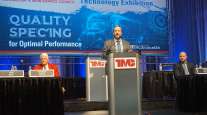Features Editor
Step Up Push to Bring Veterans Into Trucking

[Find the latest in equipment & maintenance: Explore this quarter's issue of Calibrate]
If there’s an issue that is much discussed in industry circles, it’s undoubtedly dealing with the worker shortage, more specifically, the technician shortage.
According to American Trucking Associations, the number of qualified technicians needed to field the workforce is about 75,000, while the Bureau of Labor Statistics projects that tech demand will grow by 5% from 2020 to 2030, adding approximately 19,100 jobs. Some studies push that number past 20,000.
Unlike the efforts that have been made for the ongoing driver shortage — for instance, dropping the minimum age for interstate commercial travel from 21 to 18 — there isn’t a particular legislative maneuver to tip the scales allowing more inflows of qualified applicants to the world of auto technology. Much of the groundwork to promote the industry and encourage participation lies with associations, training schools and other company recruitment efforts.
It surely is not an easy task to raise awareness of a career that severely lacks personnel in general, but as a veteran, I thought that it should be appealing for most veterans to enter this field. However, I understand that frustration. According to data from BLS, as of 2021, more than 10% of veterans were employed in the transportation and material moving occupation, including the logistics and trucking industry.

Freeze
Anecdotally, I personally know several of my shipmates who have been driving trucks for decades and know their way around a diesel engine. If I didn’t know any better, I’d think that percentage would be much higher.
I was once an outgoing service member wondering where my next career move would be. Although I wanted to pursue a career in writing, I was a certified degaussing specialist with a vast knowledge of electrician experience and a sprinkle of gas turbine engine technology know-how. If someone from an association group or tech school asked me if I was interested in a career as an auto technician, I’d probably jump at that opportunity. I still think most recently honorably discharged vets would feel the same way today.
Military veterans possess a wide range of transferable skills that seamlessly align with the requirements of the trucking industry. Their training in logistics, transportation and supply chain management, combined with their discipline, adaptability and attention to detail, make them well-suited for the demands of the profession.

More Q3 Calibrate
►Fleets Tackle Parts Shop Organization
►Freeze: Step Up Push to Bring Veterans Into Trucking
►Trucking Industry Works to Make Electric CVs More Affordable
►Baxter: Natural Gas Engines Could Reduce Fuel, Maintenance
►TMC Corner: Summer Conference Places Priority on Education
Explore the Issue!
Another aspect from the military others and I found viable was a strong emphasis on leadership development and teamwork. Most vets have firsthand experience in leading teams and collaborating effectively in diverse environments. These skills enable them to work cohesively with dispatchers, fellow drivers and other technicians. There’s also the ability to lead by example, communicate effectively and solve problems under challenging circumstances.
And lastly, I believe as akin to a college graduate, we’re trainable! To become a degaussing specialist, I was stationed at Great Lakes, Ill., to solely study the ins and outs of a vessel’s degaussing system (a process of reducing a ship’s magnetic field to make it undetectable to magnetic mines), its function and maintenance procedure processes for nearly 8 hours a day/5 days a week for a year. I studied like my life depended on it, because it literally did when my ship sailed across the Persian Gulf in the early ’90s.
In my mind, tapping into this skilled talent pool would allow fleets to enhance their operational efficiency, improve safety records and foster a culture of professionalism. It is a win-win situation that not only provides meaningful employment opportunities for veterans but also contributes to the growth and success of the industry as a whole.
The author was a third-class petty officer, electrician’s mate in the U.S. Navy.




